Corporate Culture Analysis: Enterprise Group vs Zhen Ru Enterprise
VerifiedAdded on 2023/04/22
|19
|4945
|205
Essay
AI Summary
This term paper, written for a Master's in International Business program, delves into the intricacies of corporate culture, with a specific focus on Ghanaian and Chinese companies. The paper begins with an introduction to the challenges faced by businesses in today's dynamic environment and highlights the significance of organizational culture in achieving success. A comprehensive literature review explores the definitions, levels, and conceptualizations of corporate culture, as well as its various dimensions, including attention to detail, outcome orientation, and innovation. The paper then transitions to a comparative analysis, examining the corporate cultures of Enterprise Group Limited (Ghana) and Zhen Ru Enterprise (China). The study includes a profile of Zhen Ru Enterprise, founded in 1998, it is an agent of integrated household ceramics of famous brands. The conclusion and recommendations of the paper are then highlighted.
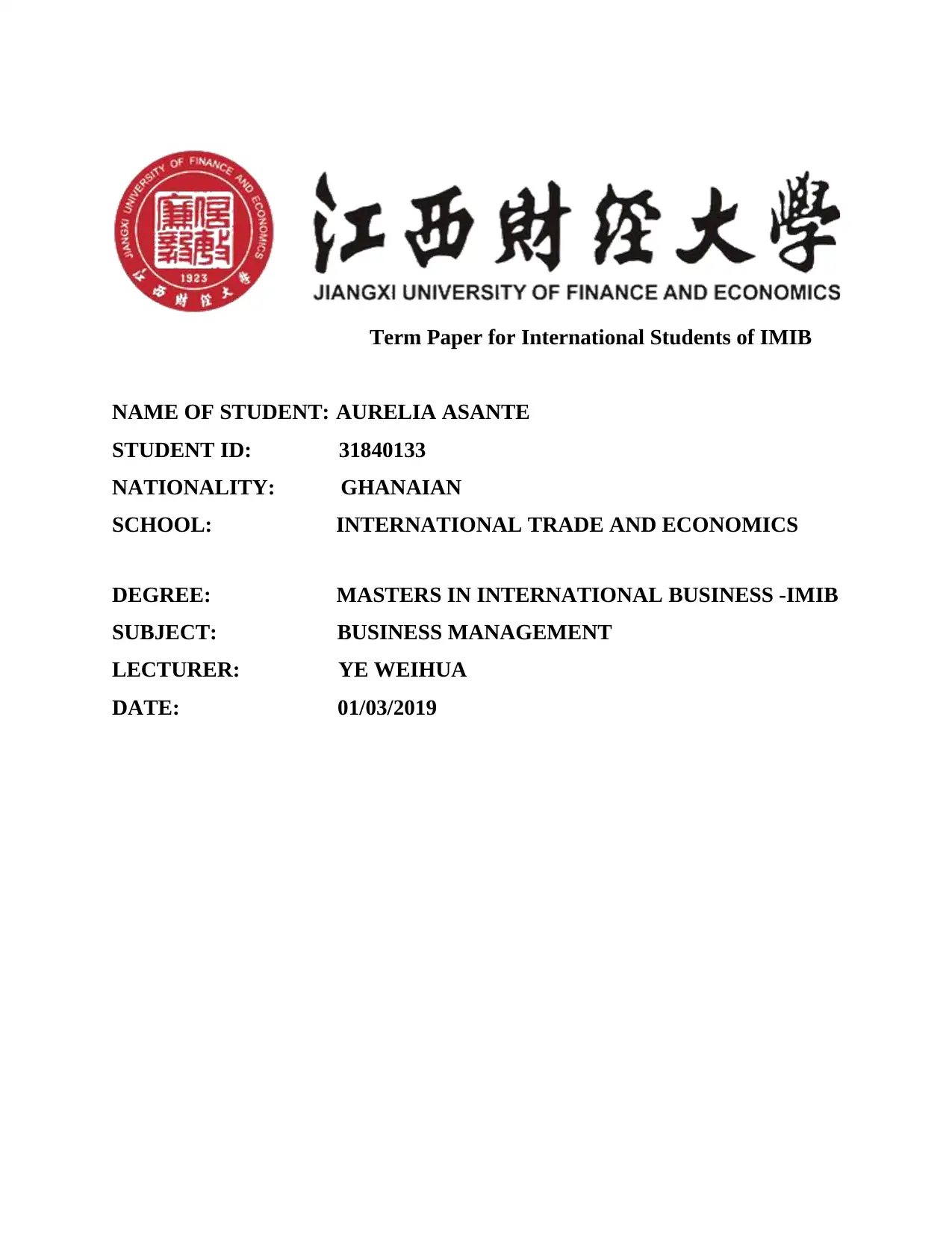
Term Paper for International Students of IMIB
NAME OF STUDENT: AURELIA ASANTE
STUDENT ID: 31840133
NATIONALITY: GHANAIAN
SCHOOL: INTERNATIONAL TRADE AND ECONOMICS
DEGREE: MASTERS IN INTERNATIONAL BUSINESS -IMIB
SUBJECT: BUSINESS MANAGEMENT
LECTURER: YE WEIHUA
DATE: 01/03/2019
NAME OF STUDENT: AURELIA ASANTE
STUDENT ID: 31840133
NATIONALITY: GHANAIAN
SCHOOL: INTERNATIONAL TRADE AND ECONOMICS
DEGREE: MASTERS IN INTERNATIONAL BUSINESS -IMIB
SUBJECT: BUSINESS MANAGEMENT
LECTURER: YE WEIHUA
DATE: 01/03/2019
Paraphrase This Document
Need a fresh take? Get an instant paraphrase of this document with our AI Paraphraser
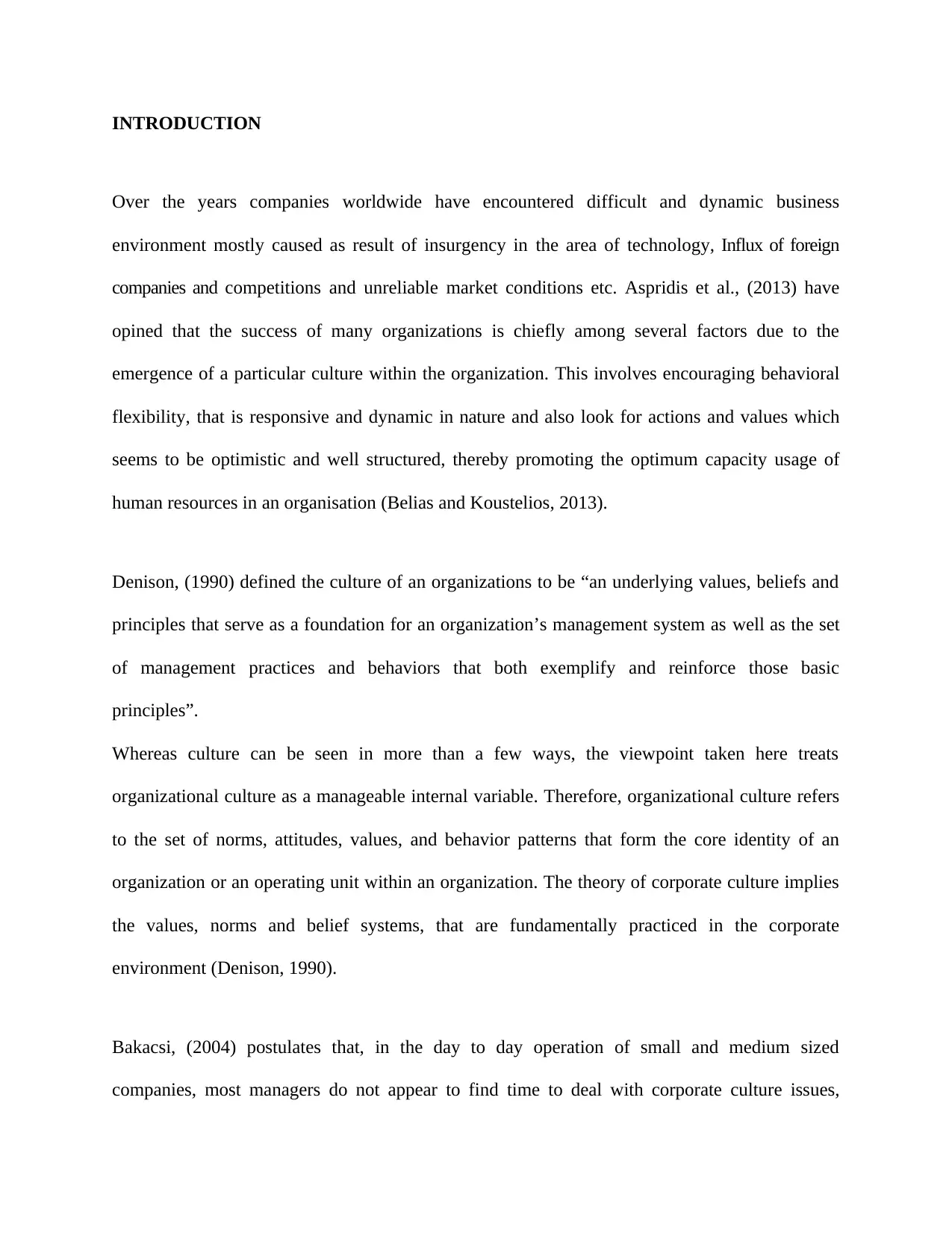
INTRODUCTION
Over the years companies worldwide have encountered difficult and dynamic business
environment mostly caused as result of insurgency in the area of technology, Influx of foreign
companies and competitions and unreliable market conditions etc. Aspridis et al., (2013) have
opined that the success of many organizations is chiefly among several factors due to the
emergence of a particular culture within the organization. This involves encouraging behavioral
flexibility, that is responsive and dynamic in nature and also look for actions and values which
seems to be optimistic and well structured, thereby promoting the optimum capacity usage of
human resources in an organisation (Belias and Koustelios, 2013).
Denison, (1990) defined the culture of an organizations to be “an underlying values, beliefs and
principles that serve as a foundation for an organization’s management system as well as the set
of management practices and behaviors that both exemplify and reinforce those basic
principles”.
Whereas culture can be seen in more than a few ways, the viewpoint taken here treats
organizational culture as a manageable internal variable. Therefore, organizational culture refers
to the set of norms, attitudes, values, and behavior patterns that form the core identity of an
organization or an operating unit within an organization. The theory of corporate culture implies
the values, norms and belief systems, that are fundamentally practiced in the corporate
environment (Denison, 1990).
Bakacsi, (2004) postulates that, in the day to day operation of small and medium sized
companies, most managers do not appear to find time to deal with corporate culture issues,
Over the years companies worldwide have encountered difficult and dynamic business
environment mostly caused as result of insurgency in the area of technology, Influx of foreign
companies and competitions and unreliable market conditions etc. Aspridis et al., (2013) have
opined that the success of many organizations is chiefly among several factors due to the
emergence of a particular culture within the organization. This involves encouraging behavioral
flexibility, that is responsive and dynamic in nature and also look for actions and values which
seems to be optimistic and well structured, thereby promoting the optimum capacity usage of
human resources in an organisation (Belias and Koustelios, 2013).
Denison, (1990) defined the culture of an organizations to be “an underlying values, beliefs and
principles that serve as a foundation for an organization’s management system as well as the set
of management practices and behaviors that both exemplify and reinforce those basic
principles”.
Whereas culture can be seen in more than a few ways, the viewpoint taken here treats
organizational culture as a manageable internal variable. Therefore, organizational culture refers
to the set of norms, attitudes, values, and behavior patterns that form the core identity of an
organization or an operating unit within an organization. The theory of corporate culture implies
the values, norms and belief systems, that are fundamentally practiced in the corporate
environment (Denison, 1990).
Bakacsi, (2004) postulates that, in the day to day operation of small and medium sized
companies, most managers do not appear to find time to deal with corporate culture issues,
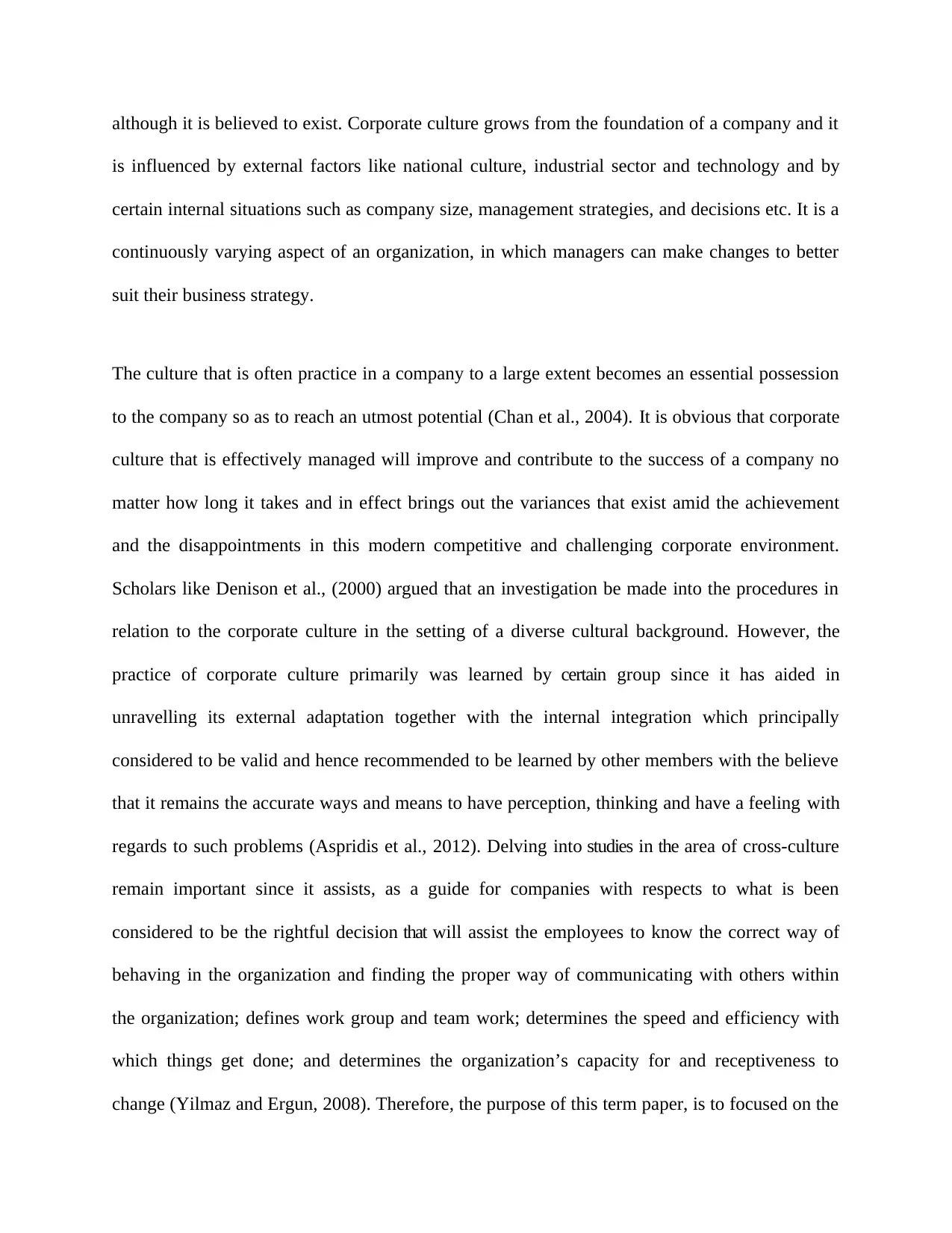
although it is believed to exist. Corporate culture grows from the foundation of a company and it
is influenced by external factors like national culture, industrial sector and technology and by
certain internal situations such as company size, management strategies, and decisions etc. It is a
continuously varying aspect of an organization, in which managers can make changes to better
suit their business strategy.
The culture that is often practice in a company to a large extent becomes an essential possession
to the company so as to reach an utmost potential (Chan et al., 2004). It is obvious that corporate
culture that is effectively managed will improve and contribute to the success of a company no
matter how long it takes and in effect brings out the variances that exist amid the achievement
and the disappointments in this modern competitive and challenging corporate environment.
Scholars like Denison et al., (2000) argued that an investigation be made into the procedures in
relation to the corporate culture in the setting of a diverse cultural background. However, the
practice of corporate culture primarily was learned by certain group since it has aided in
unravelling its external adaptation together with the internal integration which principally
considered to be valid and hence recommended to be learned by other members with the believe
that it remains the accurate ways and means to have perception, thinking and have a feeling with
regards to such problems (Aspridis et al., 2012). Delving into studies in the area of cross-culture
remain important since it assists, as a guide for companies with respects to what is been
considered to be the rightful decision that will assist the employees to know the correct way of
behaving in the organization and finding the proper way of communicating with others within
the organization; defines work group and team work; determines the speed and efficiency with
which things get done; and determines the organization’s capacity for and receptiveness to
change (Yilmaz and Ergun, 2008). Therefore, the purpose of this term paper, is to focused on the
is influenced by external factors like national culture, industrial sector and technology and by
certain internal situations such as company size, management strategies, and decisions etc. It is a
continuously varying aspect of an organization, in which managers can make changes to better
suit their business strategy.
The culture that is often practice in a company to a large extent becomes an essential possession
to the company so as to reach an utmost potential (Chan et al., 2004). It is obvious that corporate
culture that is effectively managed will improve and contribute to the success of a company no
matter how long it takes and in effect brings out the variances that exist amid the achievement
and the disappointments in this modern competitive and challenging corporate environment.
Scholars like Denison et al., (2000) argued that an investigation be made into the procedures in
relation to the corporate culture in the setting of a diverse cultural background. However, the
practice of corporate culture primarily was learned by certain group since it has aided in
unravelling its external adaptation together with the internal integration which principally
considered to be valid and hence recommended to be learned by other members with the believe
that it remains the accurate ways and means to have perception, thinking and have a feeling with
regards to such problems (Aspridis et al., 2012). Delving into studies in the area of cross-culture
remain important since it assists, as a guide for companies with respects to what is been
considered to be the rightful decision that will assist the employees to know the correct way of
behaving in the organization and finding the proper way of communicating with others within
the organization; defines work group and team work; determines the speed and efficiency with
which things get done; and determines the organization’s capacity for and receptiveness to
change (Yilmaz and Ergun, 2008). Therefore, the purpose of this term paper, is to focused on the
⊘ This is a preview!⊘
Do you want full access?
Subscribe today to unlock all pages.

Trusted by 1+ million students worldwide
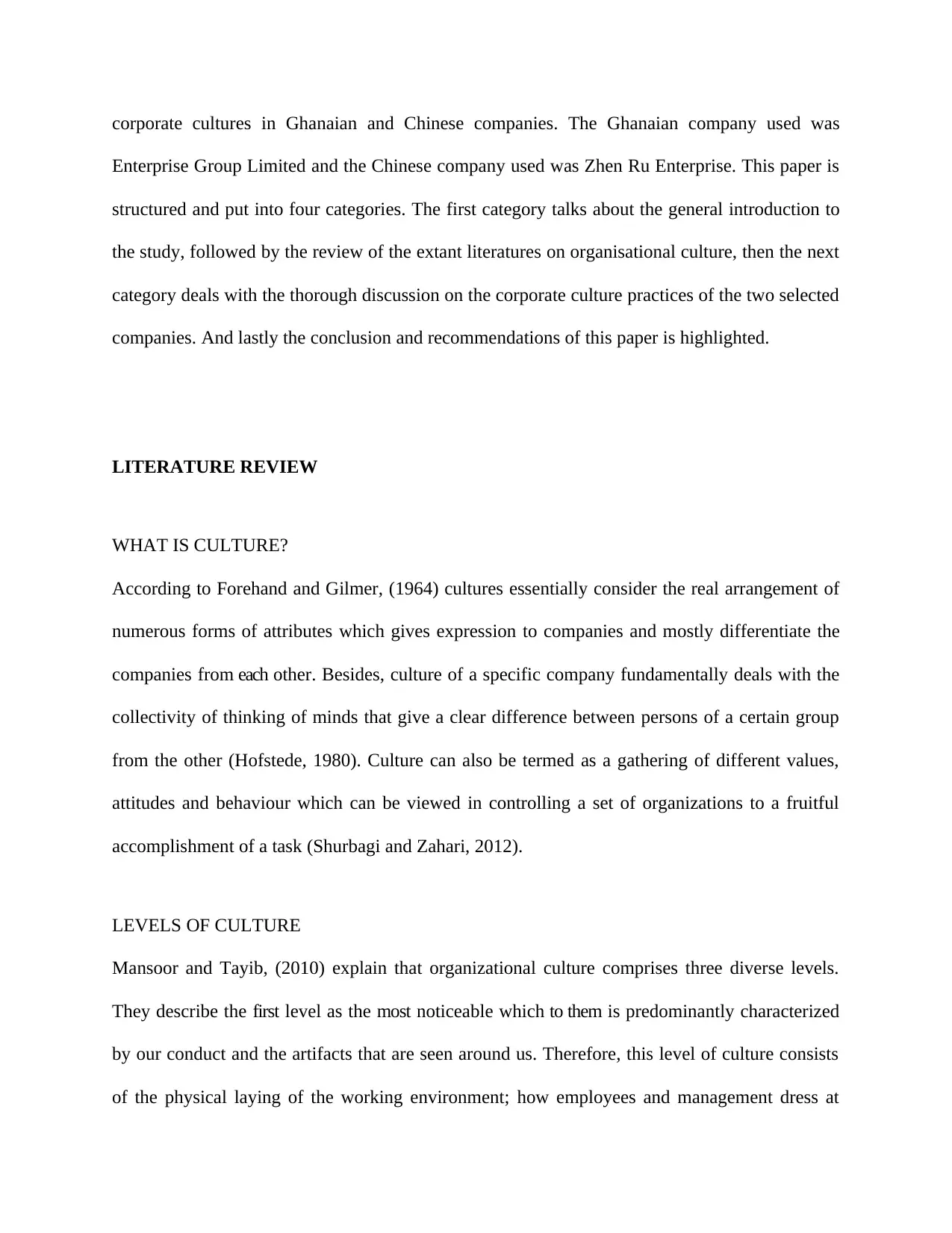
corporate cultures in Ghanaian and Chinese companies. The Ghanaian company used was
Enterprise Group Limited and the Chinese company used was Zhen Ru Enterprise. This paper is
structured and put into four categories. The first category talks about the general introduction to
the study, followed by the review of the extant literatures on organisational culture, then the next
category deals with the thorough discussion on the corporate culture practices of the two selected
companies. And lastly the conclusion and recommendations of this paper is highlighted.
LITERATURE REVIEW
WHAT IS CULTURE?
According to Forehand and Gilmer, (1964) cultures essentially consider the real arrangement of
numerous forms of attributes which gives expression to companies and mostly differentiate the
companies from each other. Besides, culture of a specific company fundamentally deals with the
collectivity of thinking of minds that give a clear difference between persons of a certain group
from the other (Hofstede, 1980). Culture can also be termed as a gathering of different values,
attitudes and behaviour which can be viewed in controlling a set of organizations to a fruitful
accomplishment of a task (Shurbagi and Zahari, 2012).
LEVELS OF CULTURE
Mansoor and Tayib, (2010) explain that organizational culture comprises three diverse levels.
They describe the first level as the most noticeable which to them is predominantly characterized
by our conduct and the artifacts that are seen around us. Therefore, this level of culture consists
of the physical laying of the working environment; how employees and management dress at
Enterprise Group Limited and the Chinese company used was Zhen Ru Enterprise. This paper is
structured and put into four categories. The first category talks about the general introduction to
the study, followed by the review of the extant literatures on organisational culture, then the next
category deals with the thorough discussion on the corporate culture practices of the two selected
companies. And lastly the conclusion and recommendations of this paper is highlighted.
LITERATURE REVIEW
WHAT IS CULTURE?
According to Forehand and Gilmer, (1964) cultures essentially consider the real arrangement of
numerous forms of attributes which gives expression to companies and mostly differentiate the
companies from each other. Besides, culture of a specific company fundamentally deals with the
collectivity of thinking of minds that give a clear difference between persons of a certain group
from the other (Hofstede, 1980). Culture can also be termed as a gathering of different values,
attitudes and behaviour which can be viewed in controlling a set of organizations to a fruitful
accomplishment of a task (Shurbagi and Zahari, 2012).
LEVELS OF CULTURE
Mansoor and Tayib, (2010) explain that organizational culture comprises three diverse levels.
They describe the first level as the most noticeable which to them is predominantly characterized
by our conduct and the artifacts that are seen around us. Therefore, this level of culture consists
of the physical laying of the working environment; how employees and management dress at
Paraphrase This Document
Need a fresh take? Get an instant paraphrase of this document with our AI Paraphraser
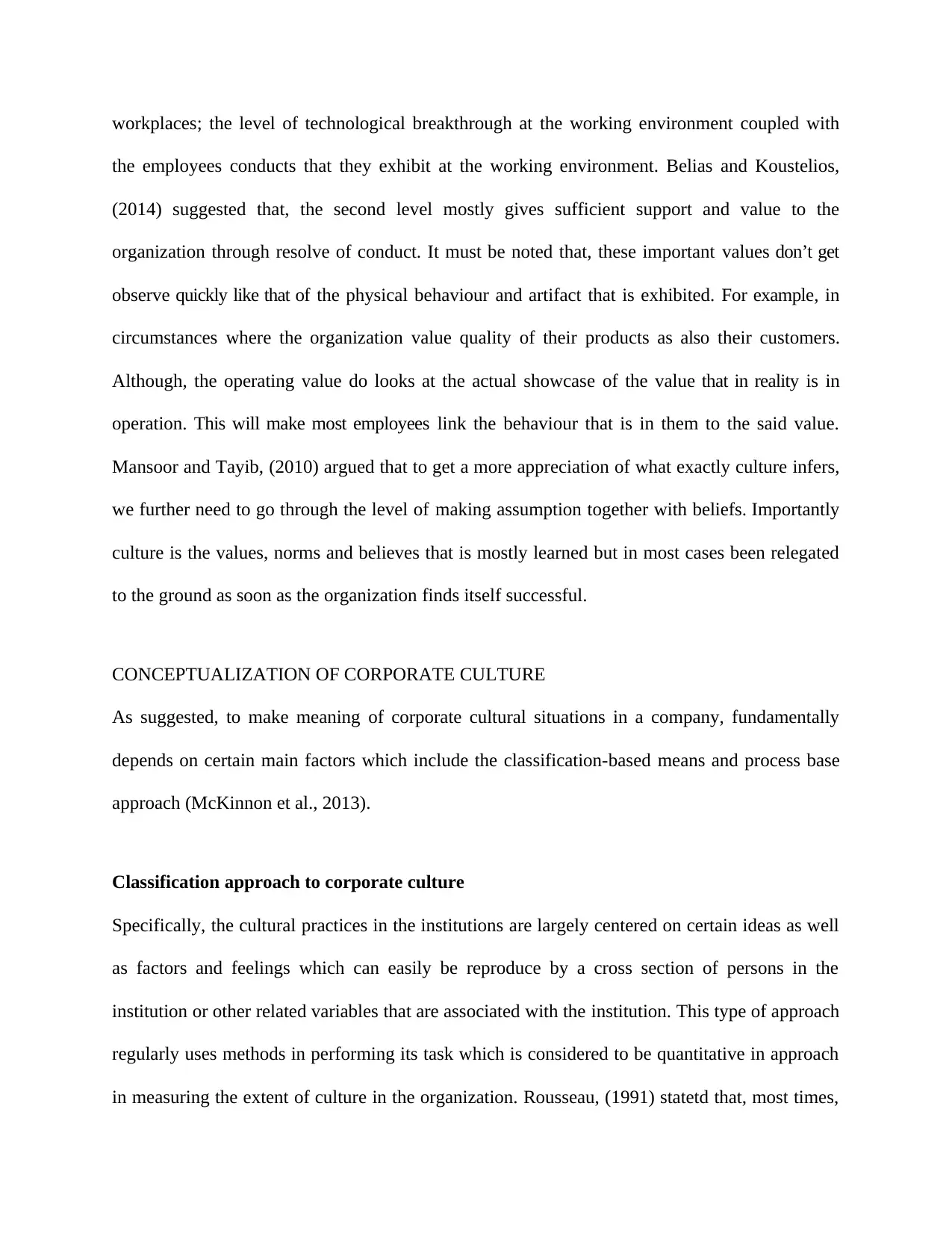
workplaces; the level of technological breakthrough at the working environment coupled with
the employees conducts that they exhibit at the working environment. Belias and Koustelios,
(2014) suggested that, the second level mostly gives sufficient support and value to the
organization through resolve of conduct. It must be noted that, these important values don’t get
observe quickly like that of the physical behaviour and artifact that is exhibited. For example, in
circumstances where the organization value quality of their products as also their customers.
Although, the operating value do looks at the actual showcase of the value that in reality is in
operation. This will make most employees link the behaviour that is in them to the said value.
Mansoor and Tayib, (2010) argued that to get a more appreciation of what exactly culture infers,
we further need to go through the level of making assumption together with beliefs. Importantly
culture is the values, norms and believes that is mostly learned but in most cases been relegated
to the ground as soon as the organization finds itself successful.
CONCEPTUALIZATION OF CORPORATE CULTURE
As suggested, to make meaning of corporate cultural situations in a company, fundamentally
depends on certain main factors which include the classification-based means and process base
approach (McKinnon et al., 2013).
Classification approach to corporate culture
Specifically, the cultural practices in the institutions are largely centered on certain ideas as well
as factors and feelings which can easily be reproduce by a cross section of persons in the
institution or other related variables that are associated with the institution. This type of approach
regularly uses methods in performing its task which is considered to be quantitative in approach
in measuring the extent of culture in the organization. Rousseau, (1991) statetd that, most times,
the employees conducts that they exhibit at the working environment. Belias and Koustelios,
(2014) suggested that, the second level mostly gives sufficient support and value to the
organization through resolve of conduct. It must be noted that, these important values don’t get
observe quickly like that of the physical behaviour and artifact that is exhibited. For example, in
circumstances where the organization value quality of their products as also their customers.
Although, the operating value do looks at the actual showcase of the value that in reality is in
operation. This will make most employees link the behaviour that is in them to the said value.
Mansoor and Tayib, (2010) argued that to get a more appreciation of what exactly culture infers,
we further need to go through the level of making assumption together with beliefs. Importantly
culture is the values, norms and believes that is mostly learned but in most cases been relegated
to the ground as soon as the organization finds itself successful.
CONCEPTUALIZATION OF CORPORATE CULTURE
As suggested, to make meaning of corporate cultural situations in a company, fundamentally
depends on certain main factors which include the classification-based means and process base
approach (McKinnon et al., 2013).
Classification approach to corporate culture
Specifically, the cultural practices in the institutions are largely centered on certain ideas as well
as factors and feelings which can easily be reproduce by a cross section of persons in the
institution or other related variables that are associated with the institution. This type of approach
regularly uses methods in performing its task which is considered to be quantitative in approach
in measuring the extent of culture in the organization. Rousseau, (1991) statetd that, most times,
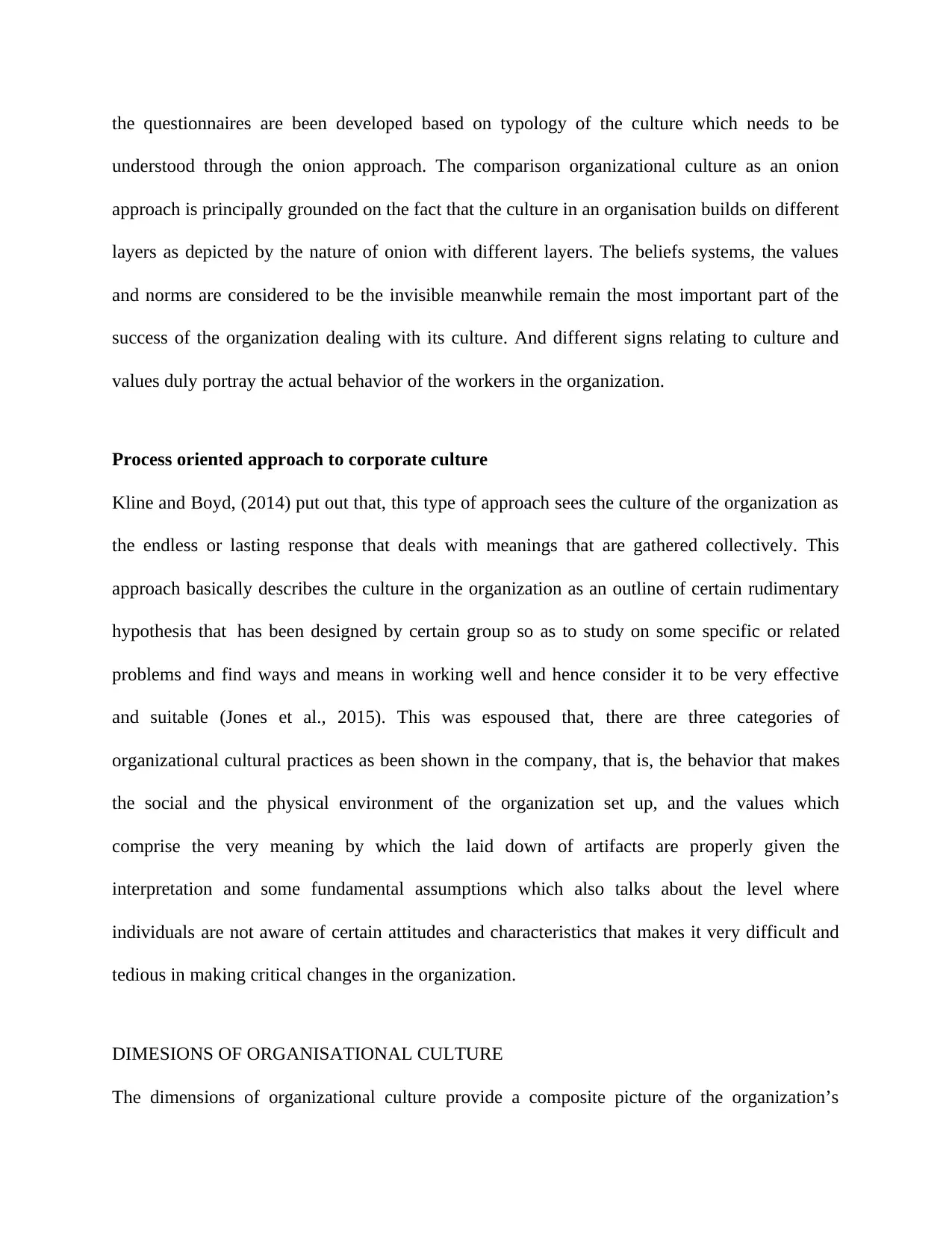
the questionnaires are been developed based on typology of the culture which needs to be
understood through the onion approach. The comparison organizational culture as an onion
approach is principally grounded on the fact that the culture in an organisation builds on different
layers as depicted by the nature of onion with different layers. The beliefs systems, the values
and norms are considered to be the invisible meanwhile remain the most important part of the
success of the organization dealing with its culture. And different signs relating to culture and
values duly portray the actual behavior of the workers in the organization.
Process oriented approach to corporate culture
Kline and Boyd, (2014) put out that, this type of approach sees the culture of the organization as
the endless or lasting response that deals with meanings that are gathered collectively. This
approach basically describes the culture in the organization as an outline of certain rudimentary
hypothesis that has been designed by certain group so as to study on some specific or related
problems and find ways and means in working well and hence consider it to be very effective
and suitable (Jones et al., 2015). This was espoused that, there are three categories of
organizational cultural practices as been shown in the company, that is, the behavior that makes
the social and the physical environment of the organization set up, and the values which
comprise the very meaning by which the laid down of artifacts are properly given the
interpretation and some fundamental assumptions which also talks about the level where
individuals are not aware of certain attitudes and characteristics that makes it very difficult and
tedious in making critical changes in the organization.
DIMESIONS OF ORGANISATIONAL CULTURE
The dimensions of organizational culture provide a composite picture of the organization’s
understood through the onion approach. The comparison organizational culture as an onion
approach is principally grounded on the fact that the culture in an organisation builds on different
layers as depicted by the nature of onion with different layers. The beliefs systems, the values
and norms are considered to be the invisible meanwhile remain the most important part of the
success of the organization dealing with its culture. And different signs relating to culture and
values duly portray the actual behavior of the workers in the organization.
Process oriented approach to corporate culture
Kline and Boyd, (2014) put out that, this type of approach sees the culture of the organization as
the endless or lasting response that deals with meanings that are gathered collectively. This
approach basically describes the culture in the organization as an outline of certain rudimentary
hypothesis that has been designed by certain group so as to study on some specific or related
problems and find ways and means in working well and hence consider it to be very effective
and suitable (Jones et al., 2015). This was espoused that, there are three categories of
organizational cultural practices as been shown in the company, that is, the behavior that makes
the social and the physical environment of the organization set up, and the values which
comprise the very meaning by which the laid down of artifacts are properly given the
interpretation and some fundamental assumptions which also talks about the level where
individuals are not aware of certain attitudes and characteristics that makes it very difficult and
tedious in making critical changes in the organization.
DIMESIONS OF ORGANISATIONAL CULTURE
The dimensions of organizational culture provide a composite picture of the organization’s
⊘ This is a preview!⊘
Do you want full access?
Subscribe today to unlock all pages.

Trusted by 1+ million students worldwide
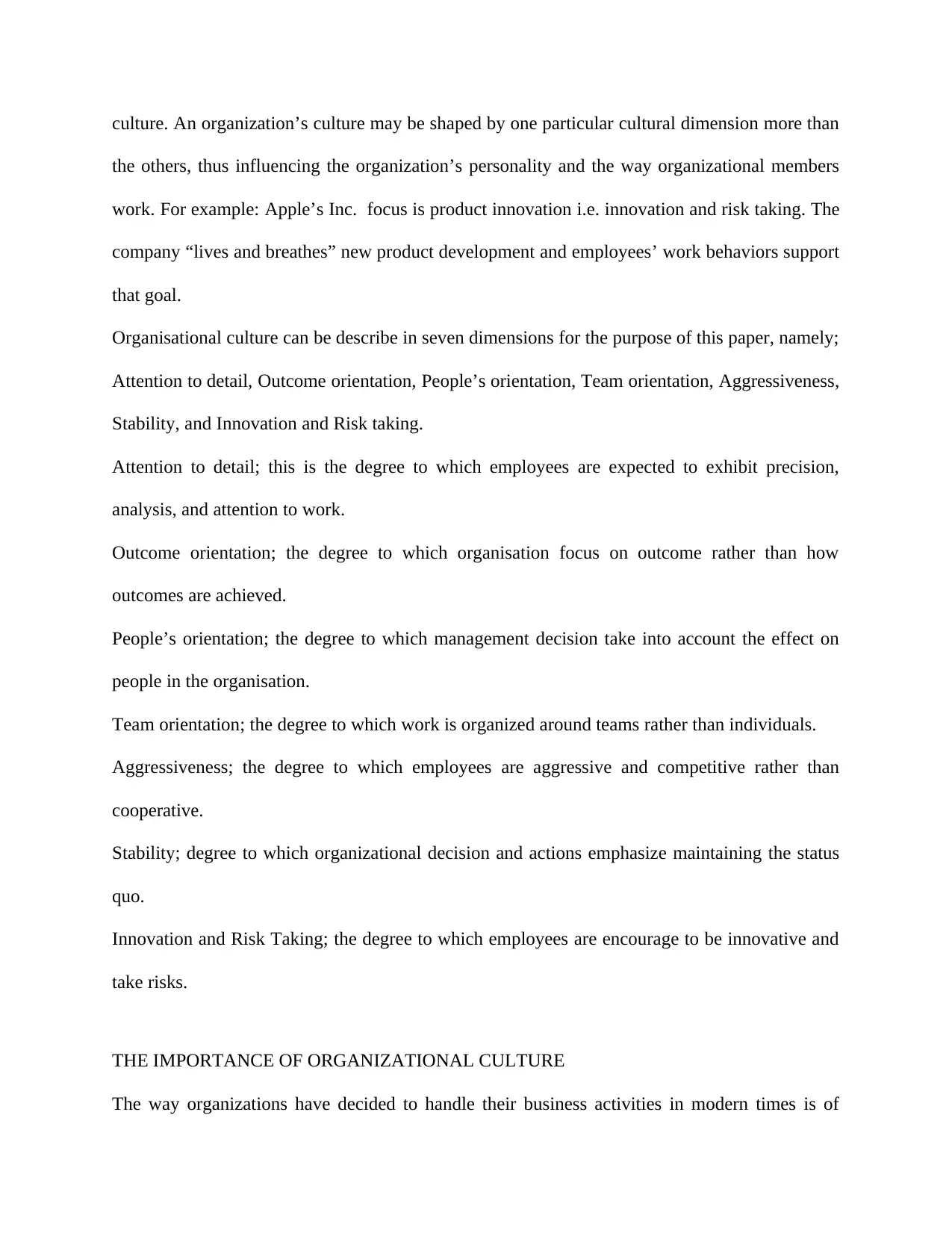
culture. An organization’s culture may be shaped by one particular cultural dimension more than
the others, thus influencing the organization’s personality and the way organizational members
work. For example: Apple’s Inc. focus is product innovation i.e. innovation and risk taking. The
company “lives and breathes” new product development and employees’ work behaviors support
that goal.
Organisational culture can be describe in seven dimensions for the purpose of this paper, namely;
Attention to detail, Outcome orientation, People’s orientation, Team orientation, Aggressiveness,
Stability, and Innovation and Risk taking.
Attention to detail; this is the degree to which employees are expected to exhibit precision,
analysis, and attention to work.
Outcome orientation; the degree to which organisation focus on outcome rather than how
outcomes are achieved.
People’s orientation; the degree to which management decision take into account the effect on
people in the organisation.
Team orientation; the degree to which work is organized around teams rather than individuals.
Aggressiveness; the degree to which employees are aggressive and competitive rather than
cooperative.
Stability; degree to which organizational decision and actions emphasize maintaining the status
quo.
Innovation and Risk Taking; the degree to which employees are encourage to be innovative and
take risks.
THE IMPORTANCE OF ORGANIZATIONAL CULTURE
The way organizations have decided to handle their business activities in modern times is of
the others, thus influencing the organization’s personality and the way organizational members
work. For example: Apple’s Inc. focus is product innovation i.e. innovation and risk taking. The
company “lives and breathes” new product development and employees’ work behaviors support
that goal.
Organisational culture can be describe in seven dimensions for the purpose of this paper, namely;
Attention to detail, Outcome orientation, People’s orientation, Team orientation, Aggressiveness,
Stability, and Innovation and Risk taking.
Attention to detail; this is the degree to which employees are expected to exhibit precision,
analysis, and attention to work.
Outcome orientation; the degree to which organisation focus on outcome rather than how
outcomes are achieved.
People’s orientation; the degree to which management decision take into account the effect on
people in the organisation.
Team orientation; the degree to which work is organized around teams rather than individuals.
Aggressiveness; the degree to which employees are aggressive and competitive rather than
cooperative.
Stability; degree to which organizational decision and actions emphasize maintaining the status
quo.
Innovation and Risk Taking; the degree to which employees are encourage to be innovative and
take risks.
THE IMPORTANCE OF ORGANIZATIONAL CULTURE
The way organizations have decided to handle their business activities in modern times is of
Paraphrase This Document
Need a fresh take? Get an instant paraphrase of this document with our AI Paraphraser
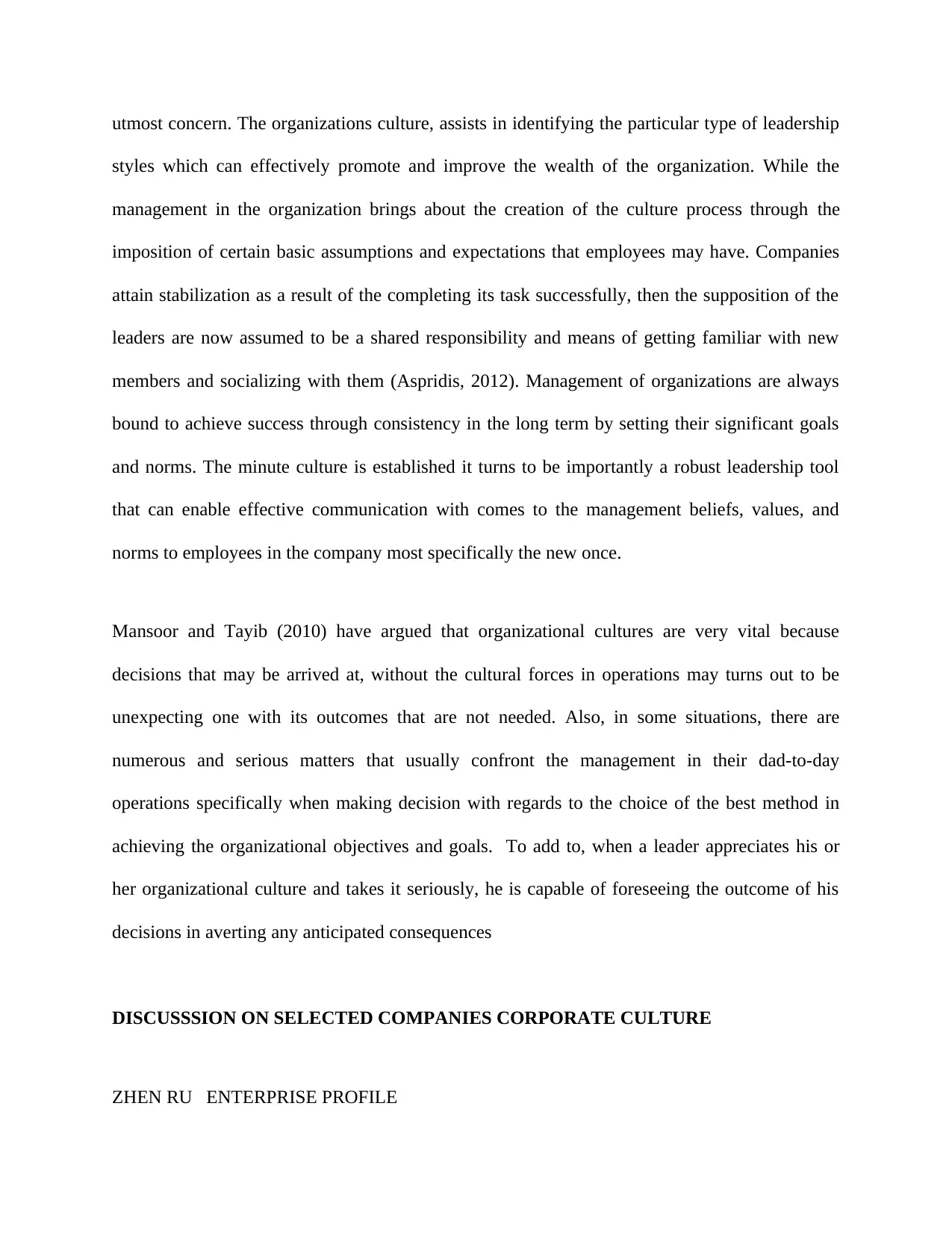
utmost concern. The organizations culture, assists in identifying the particular type of leadership
styles which can effectively promote and improve the wealth of the organization. While the
management in the organization brings about the creation of the culture process through the
imposition of certain basic assumptions and expectations that employees may have. Companies
attain stabilization as a result of the completing its task successfully, then the supposition of the
leaders are now assumed to be a shared responsibility and means of getting familiar with new
members and socializing with them (Aspridis, 2012). Management of organizations are always
bound to achieve success through consistency in the long term by setting their significant goals
and norms. The minute culture is established it turns to be importantly a robust leadership tool
that can enable effective communication with comes to the management beliefs, values, and
norms to employees in the company most specifically the new once.
Mansoor and Tayib (2010) have argued that organizational cultures are very vital because
decisions that may be arrived at, without the cultural forces in operations may turns out to be
unexpecting one with its outcomes that are not needed. Also, in some situations, there are
numerous and serious matters that usually confront the management in their dad-to-day
operations specifically when making decision with regards to the choice of the best method in
achieving the organizational objectives and goals. To add to, when a leader appreciates his or
her organizational culture and takes it seriously, he is capable of foreseeing the outcome of his
decisions in averting any anticipated consequences
DISCUSSSION ON SELECTED COMPANIES CORPORATE CULTURE
ZHEN RU ENTERPRISE PROFILE
styles which can effectively promote and improve the wealth of the organization. While the
management in the organization brings about the creation of the culture process through the
imposition of certain basic assumptions and expectations that employees may have. Companies
attain stabilization as a result of the completing its task successfully, then the supposition of the
leaders are now assumed to be a shared responsibility and means of getting familiar with new
members and socializing with them (Aspridis, 2012). Management of organizations are always
bound to achieve success through consistency in the long term by setting their significant goals
and norms. The minute culture is established it turns to be importantly a robust leadership tool
that can enable effective communication with comes to the management beliefs, values, and
norms to employees in the company most specifically the new once.
Mansoor and Tayib (2010) have argued that organizational cultures are very vital because
decisions that may be arrived at, without the cultural forces in operations may turns out to be
unexpecting one with its outcomes that are not needed. Also, in some situations, there are
numerous and serious matters that usually confront the management in their dad-to-day
operations specifically when making decision with regards to the choice of the best method in
achieving the organizational objectives and goals. To add to, when a leader appreciates his or
her organizational culture and takes it seriously, he is capable of foreseeing the outcome of his
decisions in averting any anticipated consequences
DISCUSSSION ON SELECTED COMPANIES CORPORATE CULTURE
ZHEN RU ENTERPRISE PROFILE
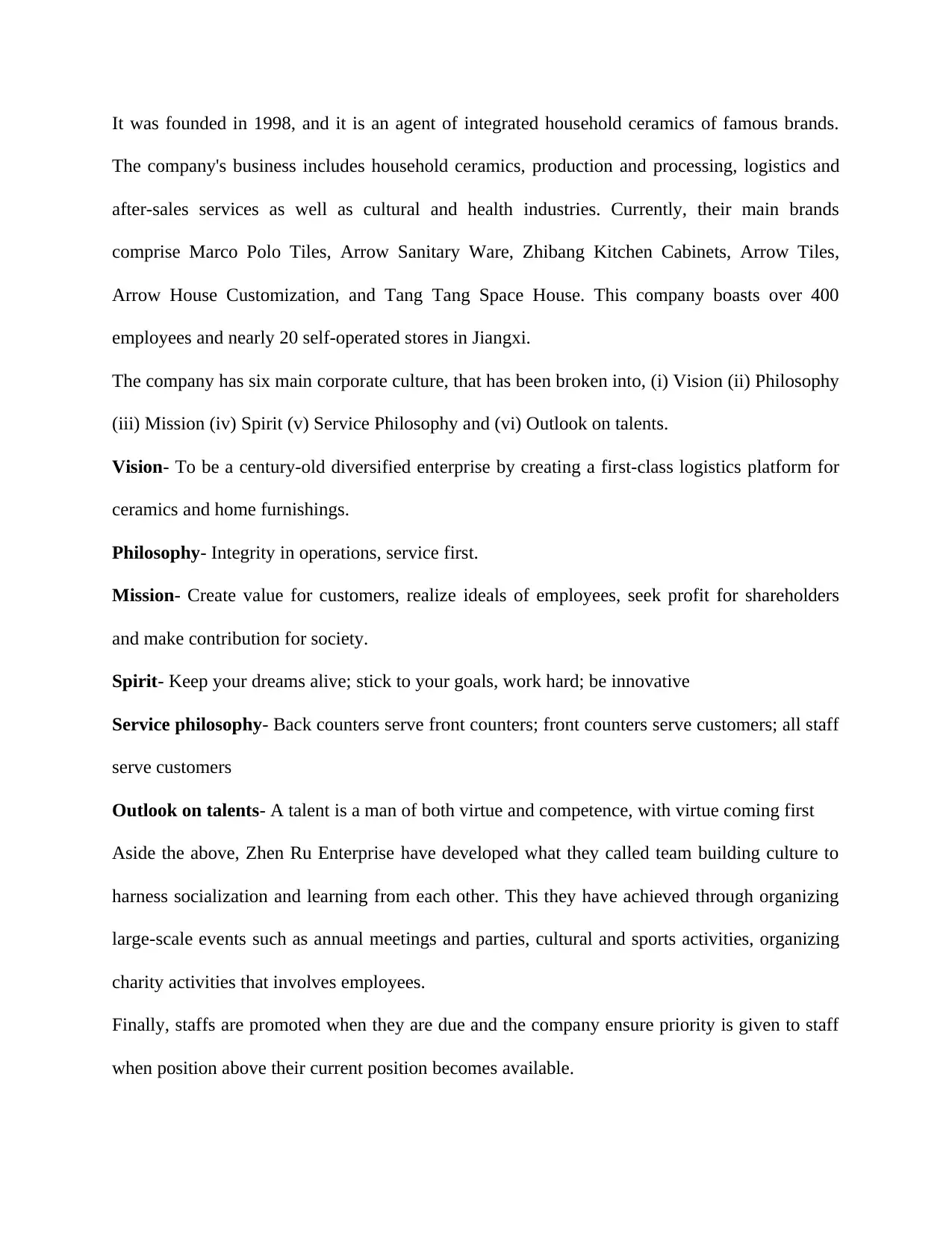
It was founded in 1998, and it is an agent of integrated household ceramics of famous brands.
The company's business includes household ceramics, production and processing, logistics and
after-sales services as well as cultural and health industries. Currently, their main brands
comprise Marco Polo Tiles, Arrow Sanitary Ware, Zhibang Kitchen Cabinets, Arrow Tiles,
Arrow House Customization, and Tang Tang Space House. This company boasts over 400
employees and nearly 20 self-operated stores in Jiangxi.
The company has six main corporate culture, that has been broken into, (i) Vision (ii) Philosophy
(iii) Mission (iv) Spirit (v) Service Philosophy and (vi) Outlook on talents.
Vision- To be a century-old diversified enterprise by creating a first-class logistics platform for
ceramics and home furnishings.
Philosophy- Integrity in operations, service first.
Mission- Create value for customers, realize ideals of employees, seek profit for shareholders
and make contribution for society.
Spirit- Keep your dreams alive; stick to your goals, work hard; be innovative
Service philosophy- Back counters serve front counters; front counters serve customers; all staff
serve customers
Outlook on talents- A talent is a man of both virtue and competence, with virtue coming first
Aside the above, Zhen Ru Enterprise have developed what they called team building culture to
harness socialization and learning from each other. This they have achieved through organizing
large-scale events such as annual meetings and parties, cultural and sports activities, organizing
charity activities that involves employees.
Finally, staffs are promoted when they are due and the company ensure priority is given to staff
when position above their current position becomes available.
The company's business includes household ceramics, production and processing, logistics and
after-sales services as well as cultural and health industries. Currently, their main brands
comprise Marco Polo Tiles, Arrow Sanitary Ware, Zhibang Kitchen Cabinets, Arrow Tiles,
Arrow House Customization, and Tang Tang Space House. This company boasts over 400
employees and nearly 20 self-operated stores in Jiangxi.
The company has six main corporate culture, that has been broken into, (i) Vision (ii) Philosophy
(iii) Mission (iv) Spirit (v) Service Philosophy and (vi) Outlook on talents.
Vision- To be a century-old diversified enterprise by creating a first-class logistics platform for
ceramics and home furnishings.
Philosophy- Integrity in operations, service first.
Mission- Create value for customers, realize ideals of employees, seek profit for shareholders
and make contribution for society.
Spirit- Keep your dreams alive; stick to your goals, work hard; be innovative
Service philosophy- Back counters serve front counters; front counters serve customers; all staff
serve customers
Outlook on talents- A talent is a man of both virtue and competence, with virtue coming first
Aside the above, Zhen Ru Enterprise have developed what they called team building culture to
harness socialization and learning from each other. This they have achieved through organizing
large-scale events such as annual meetings and parties, cultural and sports activities, organizing
charity activities that involves employees.
Finally, staffs are promoted when they are due and the company ensure priority is given to staff
when position above their current position becomes available.
⊘ This is a preview!⊘
Do you want full access?
Subscribe today to unlock all pages.

Trusted by 1+ million students worldwide
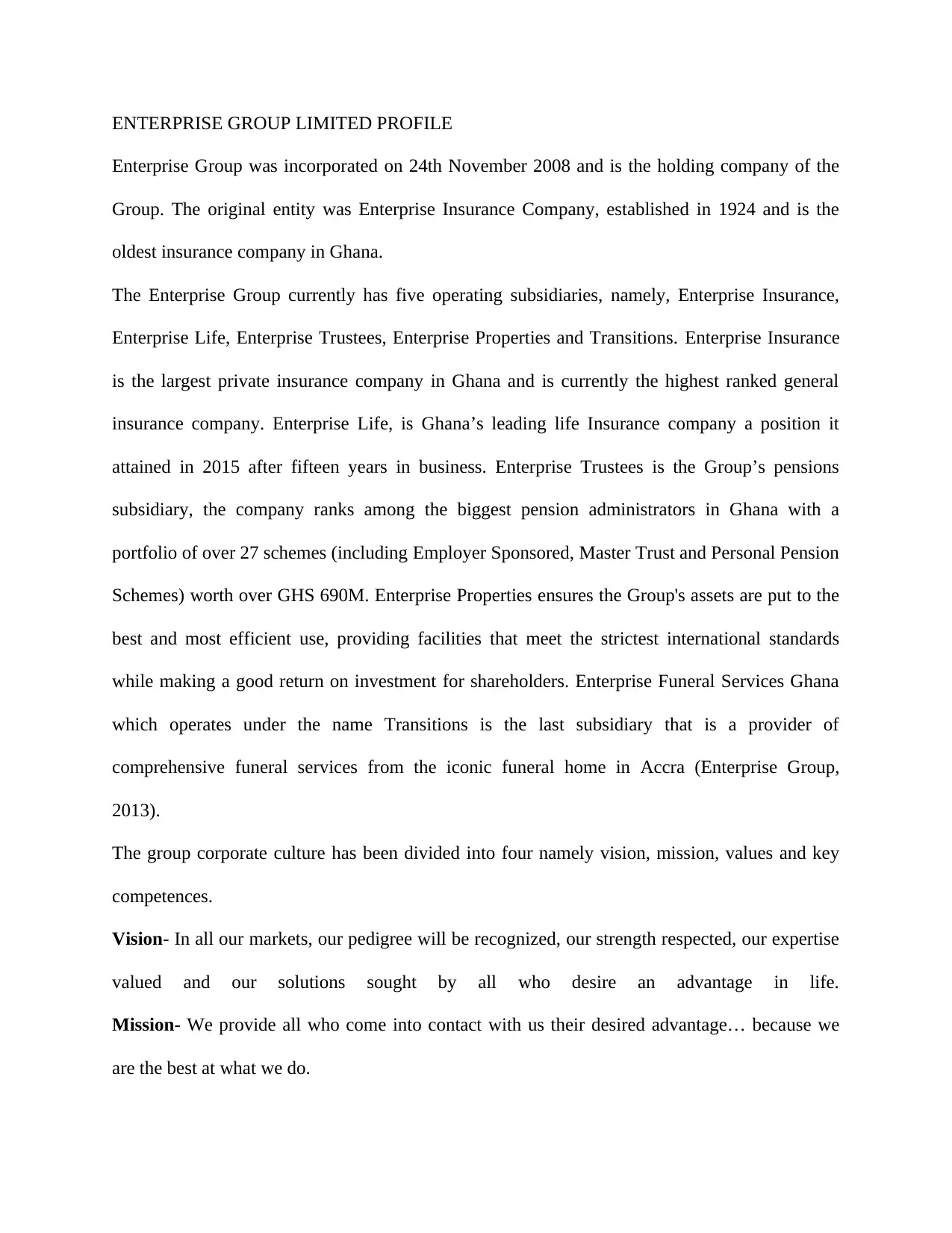
ENTERPRISE GROUP LIMITED PROFILE
Enterprise Group was incorporated on 24th November 2008 and is the holding company of the
Group. The original entity was Enterprise Insurance Company, established in 1924 and is the
oldest insurance company in Ghana.
The Enterprise Group currently has five operating subsidiaries, namely, Enterprise Insurance,
Enterprise Life, Enterprise Trustees, Enterprise Properties and Transitions. Enterprise Insurance
is the largest private insurance company in Ghana and is currently the highest ranked general
insurance company. Enterprise Life, is Ghana’s leading life Insurance company a position it
attained in 2015 after fifteen years in business. Enterprise Trustees is the Group’s pensions
subsidiary, the company ranks among the biggest pension administrators in Ghana with a
portfolio of over 27 schemes (including Employer Sponsored, Master Trust and Personal Pension
Schemes) worth over GHS 690M. Enterprise Properties ensures the Group's assets are put to the
best and most efficient use, providing facilities that meet the strictest international standards
while making a good return on investment for shareholders. Enterprise Funeral Services Ghana
which operates under the name Transitions is the last subsidiary that is a provider of
comprehensive funeral services from the iconic funeral home in Accra (Enterprise Group,
2013).
The group corporate culture has been divided into four namely vision, mission, values and key
competences.
Vision- In all our markets, our pedigree will be recognized, our strength respected, our expertise
valued and our solutions sought by all who desire an advantage in life.
Mission- We provide all who come into contact with us their desired advantage… because we
are the best at what we do.
Enterprise Group was incorporated on 24th November 2008 and is the holding company of the
Group. The original entity was Enterprise Insurance Company, established in 1924 and is the
oldest insurance company in Ghana.
The Enterprise Group currently has five operating subsidiaries, namely, Enterprise Insurance,
Enterprise Life, Enterprise Trustees, Enterprise Properties and Transitions. Enterprise Insurance
is the largest private insurance company in Ghana and is currently the highest ranked general
insurance company. Enterprise Life, is Ghana’s leading life Insurance company a position it
attained in 2015 after fifteen years in business. Enterprise Trustees is the Group’s pensions
subsidiary, the company ranks among the biggest pension administrators in Ghana with a
portfolio of over 27 schemes (including Employer Sponsored, Master Trust and Personal Pension
Schemes) worth over GHS 690M. Enterprise Properties ensures the Group's assets are put to the
best and most efficient use, providing facilities that meet the strictest international standards
while making a good return on investment for shareholders. Enterprise Funeral Services Ghana
which operates under the name Transitions is the last subsidiary that is a provider of
comprehensive funeral services from the iconic funeral home in Accra (Enterprise Group,
2013).
The group corporate culture has been divided into four namely vision, mission, values and key
competences.
Vision- In all our markets, our pedigree will be recognized, our strength respected, our expertise
valued and our solutions sought by all who desire an advantage in life.
Mission- We provide all who come into contact with us their desired advantage… because we
are the best at what we do.
Paraphrase This Document
Need a fresh take? Get an instant paraphrase of this document with our AI Paraphraser
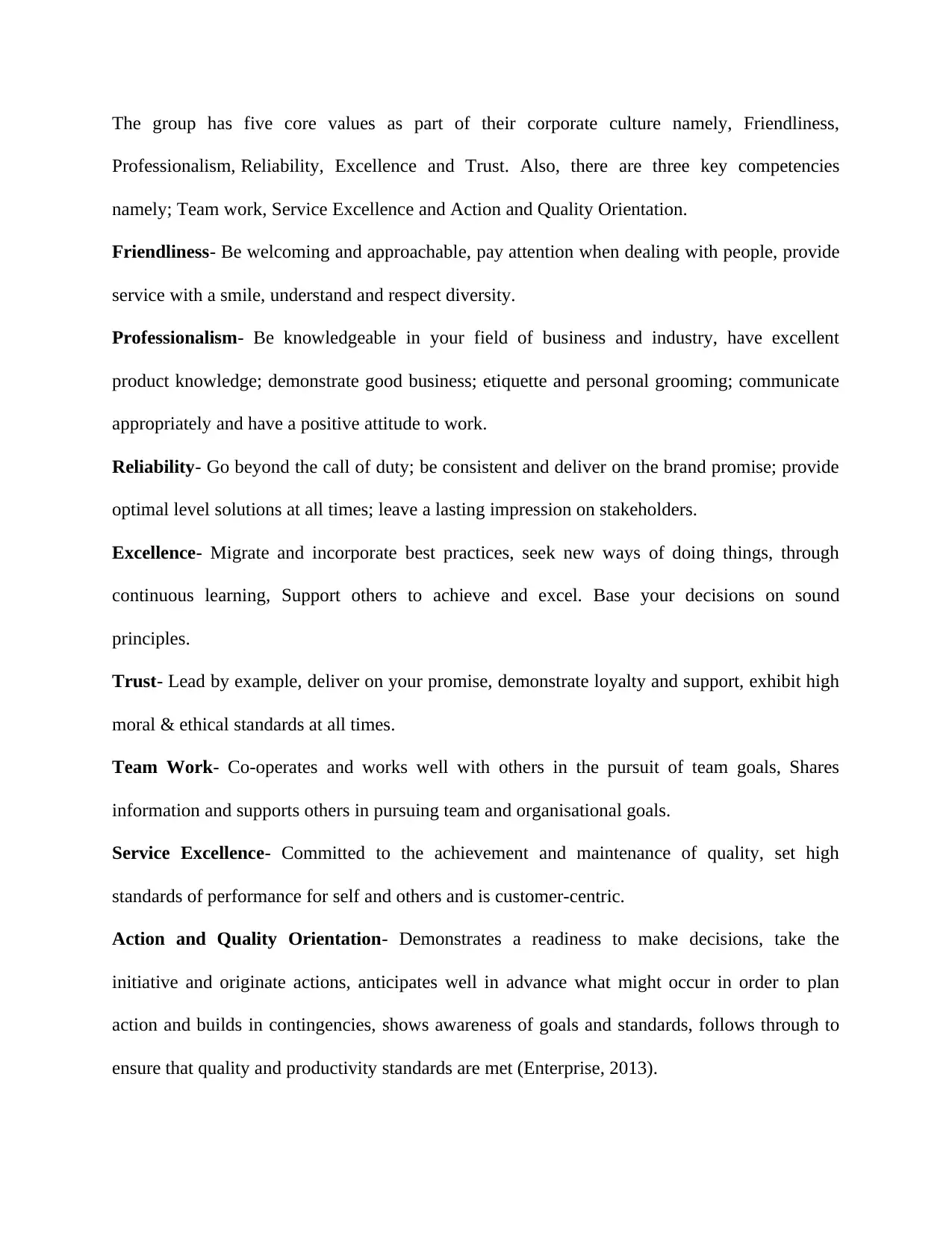
The group has five core values as part of their corporate culture namely, Friendliness,
Professionalism, Reliability, Excellence and Trust. Also, there are three key competencies
namely; Team work, Service Excellence and Action and Quality Orientation.
Friendliness- Be welcoming and approachable, pay attention when dealing with people, provide
service with a smile, understand and respect diversity.
Professionalism- Be knowledgeable in your field of business and industry, have excellent
product knowledge; demonstrate good business; etiquette and personal grooming; communicate
appropriately and have a positive attitude to work.
Reliability- Go beyond the call of duty; be consistent and deliver on the brand promise; provide
optimal level solutions at all times; leave a lasting impression on stakeholders.
Excellence- Migrate and incorporate best practices, seek new ways of doing things, through
continuous learning, Support others to achieve and excel. Base your decisions on sound
principles.
Trust- Lead by example, deliver on your promise, demonstrate loyalty and support, exhibit high
moral & ethical standards at all times.
Team Work- Co-operates and works well with others in the pursuit of team goals, Shares
information and supports others in pursuing team and organisational goals.
Service Excellence- Committed to the achievement and maintenance of quality, set high
standards of performance for self and others and is customer-centric.
Action and Quality Orientation- Demonstrates a readiness to make decisions, take the
initiative and originate actions, anticipates well in advance what might occur in order to plan
action and builds in contingencies, shows awareness of goals and standards, follows through to
ensure that quality and productivity standards are met (Enterprise, 2013).
Professionalism, Reliability, Excellence and Trust. Also, there are three key competencies
namely; Team work, Service Excellence and Action and Quality Orientation.
Friendliness- Be welcoming and approachable, pay attention when dealing with people, provide
service with a smile, understand and respect diversity.
Professionalism- Be knowledgeable in your field of business and industry, have excellent
product knowledge; demonstrate good business; etiquette and personal grooming; communicate
appropriately and have a positive attitude to work.
Reliability- Go beyond the call of duty; be consistent and deliver on the brand promise; provide
optimal level solutions at all times; leave a lasting impression on stakeholders.
Excellence- Migrate and incorporate best practices, seek new ways of doing things, through
continuous learning, Support others to achieve and excel. Base your decisions on sound
principles.
Trust- Lead by example, deliver on your promise, demonstrate loyalty and support, exhibit high
moral & ethical standards at all times.
Team Work- Co-operates and works well with others in the pursuit of team goals, Shares
information and supports others in pursuing team and organisational goals.
Service Excellence- Committed to the achievement and maintenance of quality, set high
standards of performance for self and others and is customer-centric.
Action and Quality Orientation- Demonstrates a readiness to make decisions, take the
initiative and originate actions, anticipates well in advance what might occur in order to plan
action and builds in contingencies, shows awareness of goals and standards, follows through to
ensure that quality and productivity standards are met (Enterprise, 2013).
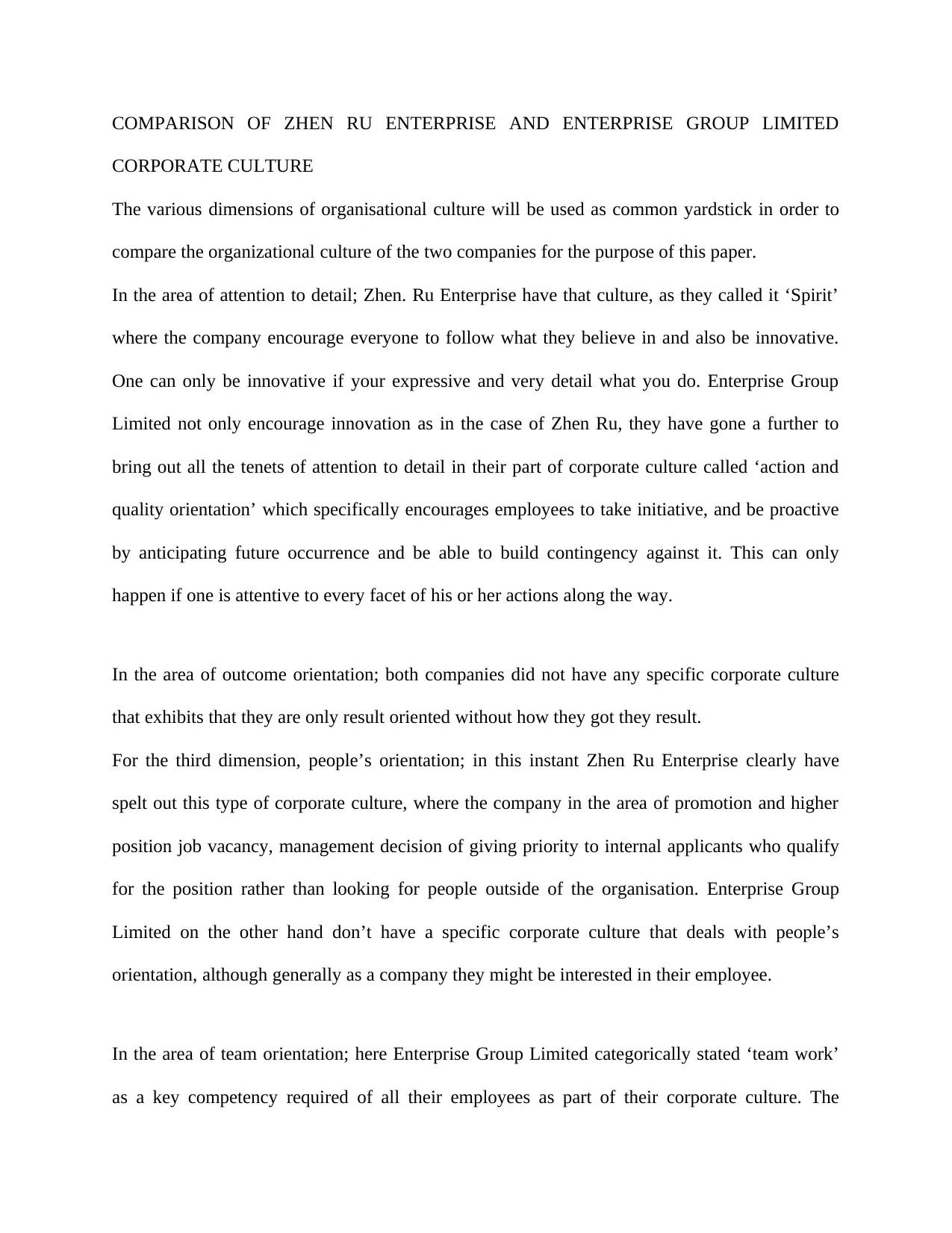
COMPARISON OF ZHEN RU ENTERPRISE AND ENTERPRISE GROUP LIMITED
CORPORATE CULTURE
The various dimensions of organisational culture will be used as common yardstick in order to
compare the organizational culture of the two companies for the purpose of this paper.
In the area of attention to detail; Zhen. Ru Enterprise have that culture, as they called it ‘Spirit’
where the company encourage everyone to follow what they believe in and also be innovative.
One can only be innovative if your expressive and very detail what you do. Enterprise Group
Limited not only encourage innovation as in the case of Zhen Ru, they have gone a further to
bring out all the tenets of attention to detail in their part of corporate culture called ‘action and
quality orientation’ which specifically encourages employees to take initiative, and be proactive
by anticipating future occurrence and be able to build contingency against it. This can only
happen if one is attentive to every facet of his or her actions along the way.
In the area of outcome orientation; both companies did not have any specific corporate culture
that exhibits that they are only result oriented without how they got they result.
For the third dimension, people’s orientation; in this instant Zhen Ru Enterprise clearly have
spelt out this type of corporate culture, where the company in the area of promotion and higher
position job vacancy, management decision of giving priority to internal applicants who qualify
for the position rather than looking for people outside of the organisation. Enterprise Group
Limited on the other hand don’t have a specific corporate culture that deals with people’s
orientation, although generally as a company they might be interested in their employee.
In the area of team orientation; here Enterprise Group Limited categorically stated ‘team work’
as a key competency required of all their employees as part of their corporate culture. The
CORPORATE CULTURE
The various dimensions of organisational culture will be used as common yardstick in order to
compare the organizational culture of the two companies for the purpose of this paper.
In the area of attention to detail; Zhen. Ru Enterprise have that culture, as they called it ‘Spirit’
where the company encourage everyone to follow what they believe in and also be innovative.
One can only be innovative if your expressive and very detail what you do. Enterprise Group
Limited not only encourage innovation as in the case of Zhen Ru, they have gone a further to
bring out all the tenets of attention to detail in their part of corporate culture called ‘action and
quality orientation’ which specifically encourages employees to take initiative, and be proactive
by anticipating future occurrence and be able to build contingency against it. This can only
happen if one is attentive to every facet of his or her actions along the way.
In the area of outcome orientation; both companies did not have any specific corporate culture
that exhibits that they are only result oriented without how they got they result.
For the third dimension, people’s orientation; in this instant Zhen Ru Enterprise clearly have
spelt out this type of corporate culture, where the company in the area of promotion and higher
position job vacancy, management decision of giving priority to internal applicants who qualify
for the position rather than looking for people outside of the organisation. Enterprise Group
Limited on the other hand don’t have a specific corporate culture that deals with people’s
orientation, although generally as a company they might be interested in their employee.
In the area of team orientation; here Enterprise Group Limited categorically stated ‘team work’
as a key competency required of all their employees as part of their corporate culture. The
⊘ This is a preview!⊘
Do you want full access?
Subscribe today to unlock all pages.

Trusted by 1+ million students worldwide
1 out of 19
Related Documents
Your All-in-One AI-Powered Toolkit for Academic Success.
+13062052269
info@desklib.com
Available 24*7 on WhatsApp / Email
![[object Object]](/_next/static/media/star-bottom.7253800d.svg)
Unlock your academic potential
Copyright © 2020–2026 A2Z Services. All Rights Reserved. Developed and managed by ZUCOL.




